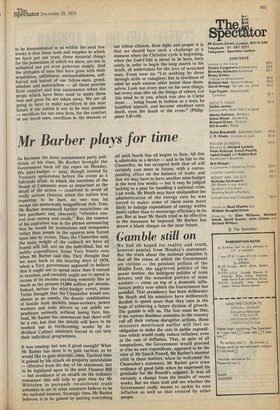Mr Barber plays for time
As becomes the most consummate party politician of his time, Mr Barber brought the Government back off the ropes on Monday. His mini-budget — mini, though treated by Treasury spokesmen before the event as a full-scale affair, in which the emotions of the House of Commons were as important as the detail of the action — contrived to avoid all really serious choices: when the nation was expecting to be hurt, no one was hit except the numerically insignificant rich. True, Mr Barber announced further restrictions on hire purchase; and, obscurely, "effective control over money and credit." But, the essence of his aspiration was in the phrase announcing that he would hit institutions and companies rather than people in the squeeze now forced upon him by events. Thus, the Chancellor said, the main weight of the cutback we have all feared will fall, not on the individual, but on public expenditure. Some Tory hearts rose when Mr Barber said this. They thought that we were back to the bracing days of 1970, when a Tory government appeared to believe that it ought not to spend more than it earned in taxation, and certainly ought not to spend in excess of its income anything remotely like as much as the present £4,000 million per annum. Indeed, before the mini-budget event, some Tories thought that the Chancellor would use, almost as an emetic, the drastic combination of hostile Arab sheikhs, mine-workers, power workers and train drivers to cut public expenditure seriously without losing face. Instead, Mr Barber has announced that there will be a cut, but that the details will have to be worked out in forthcoming weeks by individual Cabinet ministers forced to cut into their individual programmes.
It was rousing: but was it good enough? What Mr Barber has done is to gain tactical, as he would like to gain strategic, time. Tactical time is gained by his attack on property speculation — effective from the day of his statement, but to be legislated upon in the next Finance Bill — but avoidance of an attack on the ordinary consumer: this will help to gain time for Mr Whitelaw to persuade recalcitrant trade unionists to act in what ministers believe to be the national interest. Strategic time, Mr Barber believes, is to be gained by putting everything off until North Sea oil begins to flow. All this is admirable as a device — and to be fair to the Chancellor, he has accepted both that oil will certainly cost more in future, with a corresponding effect on the balance of trade, and that we may have to have another mini-budget in the next few weeks — but it may be judged lacking as a plan for handling a national crisis. Last week, Mr Heath may have mishandled the administration of the energy cuts he was forced to make: some of them seem more likely to indulge expenditure of energy within limits rather than to encourage efficiency in its use. But at least Mr Heath tried to be effective in the measures he imposed. Mr Barber has drawn a blank cheque on the near future.


































 Previous page
Previous page